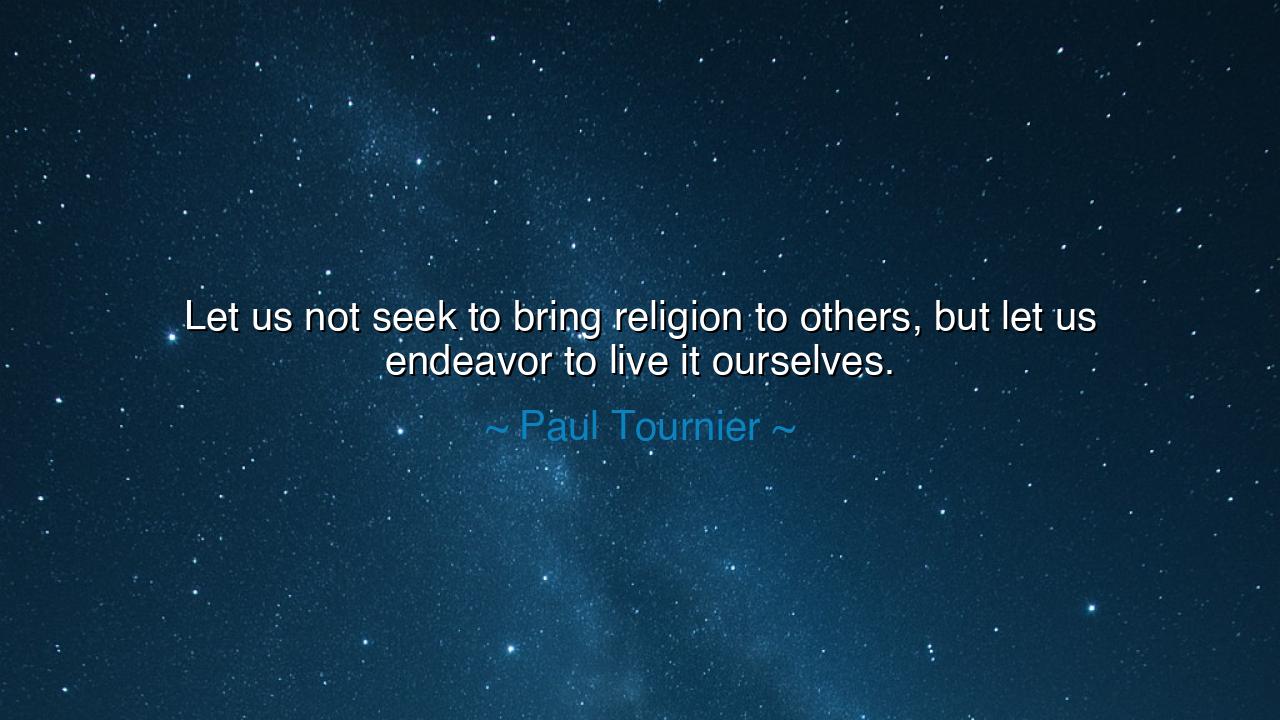
Let us not seek to bring religion to others, but let us endeavor






“Let us not seek to bring religion to others, but let us endeavor to live it ourselves.” Thus spoke Paul Tournier, the Swiss physician and Christian philosopher, whose life was a bridge between science and faith, between healing of the body and healing of the soul. In this single sentence, he gives us a teaching both humbling and divine: that faith is not to be preached before it is practiced, that religion is not an argument to be won but a life to be lived. His words rise as a quiet rebuke to the pride of the age — to those who speak of holiness with their lips while their hearts remain unmoved.
Tournier lived in the twentieth century, a time of war, despair, and great questioning. He was not a priest in robes, but a doctor of souls who saw the suffering of men not as symptoms, but as cries for meaning. In his counseling and writing, he realized that many had heard of God, but few had seen Him — because His image had been dimmed by those who claimed to follow Him but did not live as He taught. Thus, this quote was born not from theory, but from compassion — the wisdom of a man who knew that the truest sermon is the one spoken through character.
When Tournier says, “Let us not seek to bring religion to others,” he does not deny the value of sharing faith. Rather, he warns against the kind of religion that is imposed, not embodied. True religion cannot be forced upon another soul like a garment too small for its frame. It must be seen, felt, and witnessed in the living example of one who walks with integrity, humility, and love. The greatest conversion, he teaches, comes not through argument, but through presence — through the quiet radiance of a person whose life reflects the peace and mercy of the Divine.
To “endeavor to live it ourselves” is to remember that faith begins not in temples or sermons, but in the heart’s daily choices — in forgiveness offered when anger would be easier, in generosity given without witness, in patience where the world would rush. It is to take the teachings of heaven and breathe them into the dust of the ordinary day. The one who lives their faith becomes a living scripture — a walking parable that others read with their eyes long before they listen with their ears.
Consider the life of Saint Francis of Assisi, who embodied Tournier’s wisdom centuries before it was spoken. Francis preached rarely, but when he did, it was said his life was the greater sermon. He cared for the sick, loved the poor, and spoke to all creatures as brothers and sisters of the same Creator. Once, when his disciples asked him to preach to a nearby village, he walked with them through its streets for hours and spoke not a single word. When they returned, puzzled, he said, “We have preached — by our presence.” Such is the essence of Tournier’s teaching: that to live the truth is to proclaim it without speech.
Tournier also reminds us of the danger of hypocrisy — that when we speak of faith without living it, we wound the very thing we claim to defend. The world has grown weary of sermons; it thirsts instead for examples. Religion that remains only on the tongue turns people away; religion that shines through compassion draws them near. The true disciple, then, is not one who converts the multitudes with eloquence, but one who converts a single soul through kindness — often without knowing it.
So, O seekers of the sacred, take this wisdom into your heart: do not strive to bring religion — strive to become it. Let your faith breathe through your actions. Let your words be few, but your mercy great. Be patient with those who doubt, for once you too were uncertain. Be gentle with those who mock, for often mockery hides hunger. Live your religion so deeply that others cannot help but feel its warmth.
For in the end, as Paul Tournier knew, religion is not a doctrine but a demonstration. It is not in the loudness of our preaching that God is revealed, but in the quietness of our love. When we live truth instead of merely teaching it, we bring light where there is shadow, healing where there is hurt, and peace where there is confusion. This, and only this, is the faith that endures — not one carried in the mouth, but one written upon the soul.






AAdministratorAdministrator
Welcome, honored guests. Please leave a comment, we will respond soon